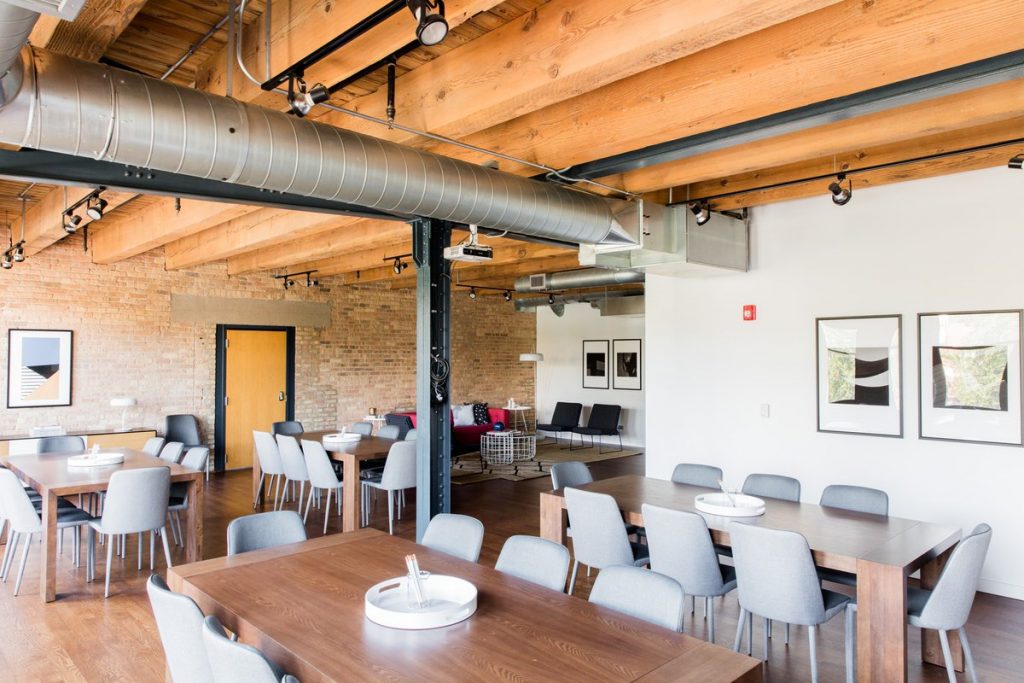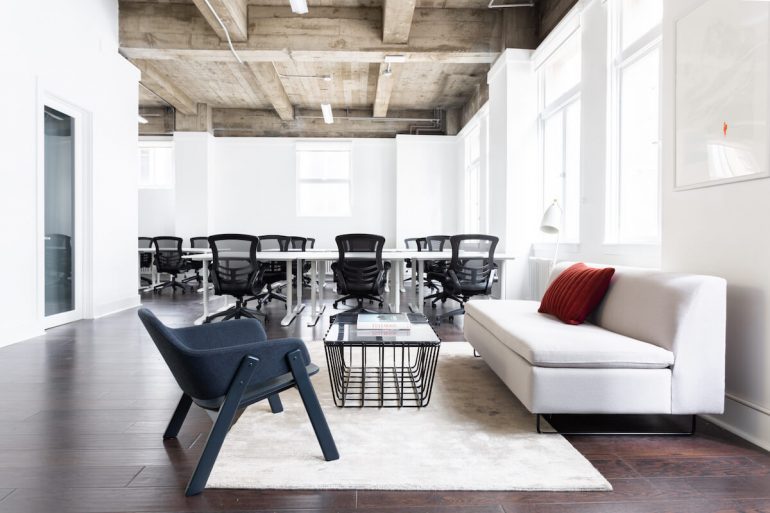Recent layoffs by Montreal-founded real estate tech startup Breather are part of a larger plan to get the company to profitability by 2021, according to an internal video recording obtained by BetaKit.
The video, a recording of a meeting led by CEO Bryan Murphy on what appears to be the day of Breather’s recent layoffs, provides several insights into the reasons behind those layoffs, the current financial health of the company, its go-forward plans, and the viability of Breather’s competition.
Breather has spent $120 million USD of the company’s $122 million publicly disclosed venture funding.
BetaKit received access to the video through an anonymous tip, which provided the URL and password to a privately-hosted Vimeo upload of the recorded meeting titled “Company Wide Announcement.” Those credentials were purportedly shared with all employees via Breather’s company Slack channel. The Vimeo account hosting the video is labelled Breather Products Inc., Breather’s legal name.
In the video, Murphy acknowledges overspending within the company, stating that Breather has spent $120 million USD of the company’s $122 million publicly disclosed venture funding. The CEO also provided assurances that there were no plans for a second round of layoffs.
Breather’s layoffs were first reported earlier this month by New York real estate publication The Real Deal, which put the layoffs at 17 percent of Breather’s overall staff. Multiple media outlets reported that approximately 22 employees had been laid off at the company, with Breather declining to confirm exact numbers. Sources familiar with the company’s operations have since confirmed to BetaKit that 17 percent of Breather’s approximately 200 employees were affected, which puts the number of employees laid off closer to 35 than the originally reported 22.
BetaKit spoke to Murphy last week, who did not deny or question the authenticity of the video recording obtained by BetaKit. Instead, Murphy shared more details about Breather’s journey over the past year, and how major shifts in the flexible and coworking space industry affected the company. The CEO also spoke to the massive opportunity he sees in the industry and how Breather plans to get to profitability by 2021.
Breather’s overspending
A former vice president at eBay, Murphy joined Breather as CEO in January, after co-founder Julien Smith stepped down from the role in late 2018.
Murphy told BetaKit that he had two mandates when he took on the role: to pivot Breather from an on-demand meeting provider to a full-service flexible workspace provider and to create a path to profitability.
“The world in venture has substantially changed in the last six months and most companies are required to have a path to profitability, and Breather is no different,” he said.

In the video recording, Murphy lays out the overspending that led Breather to burn through $120 million in financing. He notes that Breather had spent $1.1 million on SaaS, and pointed to surplus management, creating “up to 6 layers” of “redundancy that led to a lot of frustration and inefficiency.” Murphy also states that Breather had implemented $8 million in cost savings over the past year, as it first looked to avoid making cuts to personnel, with another $3 million currently being carried out.
Sources told BetaKit that Breather raised an undisclosed internal funding round in the fall to extend its runway.
Referencing the ultimate decision to lay off employees, Murphy says in the video, “one of the things that we really wanted to do here was to take an effort to flatten out the company, to clarify roles and responsibilities, and eliminate redundancy and align resources with our mission and operating plan.”
Murphy explained in his interview with BetaKit that, while difficult, the layoffs and cuts were about having the right resources focused on the company’s new operating plan. He stated that the overarching goal is to get Breather to profitability by the first quarter of 2021, which he is confident will happen if Breather remains disciplined as it grows.
Despite the cuts, Breather’s remaining $2 million in publicly announced venture funding would likely not be enough to carry the company to 2021. However, Murphy assures employees in the video that Breather has “raised the capital that we need to continue to grow.”
While Murphy did not reference specific financing in the video, sources have indicated to BetaKit that the startup raised an undisclosed internal funding round in the fall to extend its runway.
Murphy confirmed to BetaKit that a new investment had occurred within the past few months, and stated that the company’s previously announced $122 million funding total was not an accurate number. He did not confirm Breather’s total funding to date or the size of any new round, but in a follow-up statement to BetaKit noted that “the company is well capitalized.”
Breather’s investors notably include Caisse de dépôt et placement du Québec (CDPQ), Menlo Ventures, Valar Ventures, RRE Ventures, Slow Ventures, Real Ventures, and Singapore-based firms Temasek and Ascendas-Singbridge.
Breather’s pivot to flexible workspaces
Murphy is correct in noting that the world of venture capital has changed over the past year, particularly in the flexible workspace market.
It is a sector that recently saw WeWork fail to deliver on a promised IPO, excise long time CEO Adam Neumann, plummet from $47 billion USD to $5 billion USD in valuation, and layoff 2,400 employees.
“There was too much money put into this space, so that funding has largely dried up. The trick now is to survive and provide a really valued product to our customers.”
– Bryan Murphy,
Breather CEO
In the video, Murphy states that Breather currently faces less competition than it did 90 days ago, adding that the company is in a market where the “door just slammed shut” on funding opportunities for new entrants.
Murphy points to industry competitors WeWork, Knotel, Industrious, and Convene in the video, calling WeWork “recently wounded” and claiming New York-founded flexible workspace provider Knotel will “scale back.”
In his recent interview with BetaKit, Murphy likened the changes in the flexible and coworking market to what he witnessed as an entrepreneur during the ‘Dot-com bubble.’
“There was too much money put into this space, so that funding has largely dried up,” he said to BetaKit. “The trick now is to survive and provide a really valued product to our customers, and I think companies that do that and execute exceptionally well will be really successful.”
Murphy told BetaKit that he is seeing much more rational behaviour coming into the market around acquisitions, sales, and marketing. “That’s all going to be long term healthy,” he said.
Flexible workspaces are geared towards companies who might choose to have their headquarters or offices in a space that provides tenants with flexibility over location, size, term, and additional services. According to an independent study commissioned by multinational coworking space provider Regus, the flex economy is set to contribute $13.7 billion annually to the Canadian economy over the next decade, with that number jumping to $127 billion in the US.
Breather spent much of this past year making that transition to the flexible workspaces market, with Murphy telling BetaKit it has been a “tremendous success.”
“[Breather is] unlocking what’s a trillion dollar market,” Murphy told BetaKit. “The flexible office space is infinitely larger [than the on-demand meeting business] and incredibly rapidly growing. So I think we have done a good job of pivoting the business to that much, much larger and faster-growing TAM, total addressable market.”
“What we wanted to do is make sure that our resources were aligned towards that [flexible office space] business,” Murphy added, noting that the recent layoffs were part of that realignment. “[Flexible and on-demand] are different and so we need more people in some areas and less in others, and so we made those changes.”

Breather currently operates more than 500 spaces around the world. The startup opened 10 of those spaces over the summer in San Francisco, where its clients include American tech giants like Lyft, Candid, and Airbnb.
Murphy told BetaKit that Breather is focused solely on 10,000 square feet or less spaces, noting the company is very selective in where it opens locations. The CEO told BetaKit in July that Breather had sold out its spaces built since the beginning of the year, something he reiterates to employees in the video.
Murphy also tells employees that Breather is planning to add an additional 125,000 square feet of space over the next year, with a new focus on building out its services and customer experiences, as well as developing more “asset-light” operations.
The flexible workspace portion of Breather’s business has already grown quite significantly. Speaking to BetaKit in July, Murphy noted that breather had seen 300 percent year-over-year growth. That number has dipped somewhat in the second half of 2019, with Murphy telling BetaKit it currently sits at 250 percent. Murphy offers a more curbed growth projection for the coming year in the video, claiming that Breather is set to grow by 50 percent. In the video, Murphy also claims a 200 percent increase in Breather’s gross margins.
“We are prepared to take whatever legal action we feel is necessary”
In the course of its interview with Murphy, BetaKit asked several questions regarding Breather’s recent layoffs and financing, as well as information contained within the video recording, for which the CEO declined to comment. On the question of Breather’s total funding to date, Murphy offered to provide clarification at a later date.
In a follow-up statement sent to BetaKit, Murphy noted that Breather “cannot comment on the specifics of any fund raising,” adding that “the company is well capitalized.”
The statement also claims that the information contained within the video recording, which Murphy had discussed with BetaKit on the record, was confidential. In it, the CEO notes that Breather is “prepared to take whatever legal action is necessary” if BetaKit makes any further use of the video in question. Breather also reserves the right to hold BetaKit responsible for “any damages that result from inaccurate reporting regarding these matters.”
BetaKit has published Murphy’s full statement below.
Great to talk with you today. We’re trying to balance transparency, respect for our employees (present and past) and protecting our company’s confidentiality rights.
In an effort to address your questions, here’s what information I am able to share with you.
Breather has committed world class investors. As a result, The company is well capitalized to reach its long and short term growth plans. We cannot comment on the specifics of any fund raising.
You should be aware that the information shared in my meeting with the staff is confidential, and was provided to you in violation of binding contractual commitments. With that in mind, it’s our expectation that betakit [sic] will not make any further use of the video, as we are prepared to take whatever legal action we feel is necessary to prevent any further disruption to our business. We also reserve the right to hold betakit [sic] responsible for any damages that result from inaccurate reporting regarding these matters.
Please let me know if you have any other questions, I’ll do my best to help.

